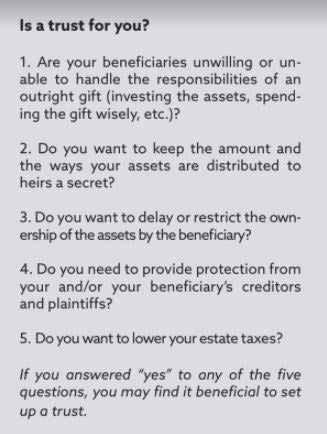The foundations of your rock-solid estate plan
For so many of us, family is paramount. You probably expect to use your wealth to take care of your family in the here and now—health care, travel, college tuition and the like. But chances are you haven’t thought nearly as much about positioning your assets so they’re ready and able to help the people you love after you’re gone. Even if you have made some headway in this area, your plan for your estate is probably a little—and maybe a lot—out of date.
If that describes your situation, don’t fret. Even if you have many moving parts to your finances, you can get on track by focusing on two main areas of estate planning: wills and trusts. Here’s how to do it.
Where there’s a will, there’s a way
Read this next sentence three times in a row: Everyone should have a will.
Got it? A will should be the basic foundation of every estate plan—the starting point for a well-conceived strategy to transfer assets at death.
A will identifies precisely what you want to have happen to your assets and estate. Dying without a will means you have decided that the state knows what’s best for you and your family. In addition, dying without a will means you want to make the settling of your estate as difficult, as costly and as public as possible.
As with any decision, there are both positives and negatives to a will. That said, we strongly believe the benefits of writing a will far outweigh the drawbacks.
Advantages:
• You decide on the disposition of your hard-earned wealth.
• Estate taxes are mitigated—especially when the will is part of a broader estate plan.
• You specify who the fiduciaries will be.
Disadvantages:
• You have to accept that one day—far in the future—you just might die.
• There is a legal cost associated with writing up a will and with estate planning.
Trust in trusts
The second component of a smart estate plan is often a trust. A trust is nothing more than a means of transferring property to a third party—the trust. Specifically, a trust lets you transfer title of your assets to trustees for the benefit of the people you want to take care of—aka your selected beneficiaries. The trustee will carry out your wishes on behalf of your beneficiaries.
WILLS AND TRUSTS COMPARED
Broadly speaking, there are two types of trusts: living (established while you are alive) and testamentary (created by your will after you’ve passed). Living trusts are becoming more and more popular to avoid the cost of probate. In the probate process, your representatives “prove” the validity of your will. The probate process also gives any creditors the opportunity to collect their due before your estate is passed to your heirs. There may be a long delay in settling your estate as it goes through probate. To add salt to the wound, probate can be costly.
A living trust can avoid or mitigate the effects of probate. It is a revocable trust that you establish and of which you are also typically the sole trustee. The assets in your living trust avoid probate at death, and are instead distributed to your heirs according to your wishes.
Living trusts are sometimes said to be superior to a will, but that is certainly not the case for everyone. It’s important that you understand how they compare.


Is a living trust for you? It depends on your particular situation. Nevertheless, you should certainly consider it in consultation with your advisor or wealth manager.
Your next move We recommend that your estate plan be reviewed every year or two. The review should be conducted by a high-caliber wealth manager or tax professional—one who takes the time to learn what’s changed since you put your solutions in place, assess how those changes might impact your strategy, and make recommendations for getting your solutions current and in accordance with your wishes.
My name is Tim McNeely, Founder, and CEO of Dentalpreneur Advisors. I consult with driven dentalpreneurs and select professionals helping you to implement lessons from the Super-Rich so you can reclaim your time and live an amazing life of significance. I was invited to contribute the foreword to Becoming Seriously Wealthy: How to Harness the Strategies of the Super Rich and Ultra-Wealthy Business Owners. You can connect with me on LinkedIn or visit me at www.timmcneely.com
Disclosure: Tax laws are subject to change, which may affect how any given strategy may perform. Always consult with a tax advisor.
ACKNOWLEDGMENT: This material is intended for educational purposes and does not constitute a solicitation to purchase a security or advisory services. Timothy McNeely has retained CEG Worldwide to conduct research and prepare informational materials for his use. This material has been researched and prepared by BSW Inner Circle and its affiliates, CEG Worldwide, LLC and AES Nation, LLC. Copyright 2020 by AES Nation, LLC. Mr. McNeely is a member of CEG Roundtable and pays an annual fee for these services. Mr. McNeely is involved in these activities through The LifeStone Companies. Timothy McNeely is an Investment Advisor Representative of Dynamic Wealth Advisor dba Lifestone Family Office. All investment advisory services are offered through Dynamic Wealth Advisor. The LifeStone Companies are not owned or legally affiliated with Dynamic Wealth Advisors and the activities conducted by Mr. McNeely under The LifeStone Companies are considered a separate outside business activity